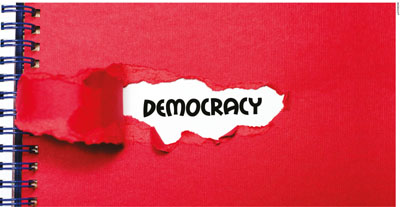STATE OF THE NATION
DEMOCRACY: ON A PATH IN THE WOODS?
Wijith DeChickera notes how strong executive drive has brought the republic to a decisive crossroads – and hopes the right road will be taken
 COVID-19 did not cause every sickness in human society. However, it did expose the underlying rottenness in many a republic. On the one hand, public safety being equated with security has so far prevented the pandemic from escalating from a disaster into tragedy.
COVID-19 did not cause every sickness in human society. However, it did expose the underlying rottenness in many a republic. On the one hand, public safety being equated with security has so far prevented the pandemic from escalating from a disaster into tragedy.
On the other, authoritarian trends have pushed the boundaries of democracy back and advanced the doctrine of necessity in consolidating the power of regimes already in place. Sri Lanka is no different. Two paths diverged in a pandemic. The high road we took has brought us good public health results but less than desirable political ramifications.
Governments the world over threatened by SARS-CoV-2 have been tempted to treat its outbreak as a war against their people. Maybe the bureaucratic militarisation of Sri Lanka isn’t unique as a response. But it merits closer inspection before we decide whether it’s in the best national interest as its defenders claim.
CONSTITUTIONALISM The supreme law of the land is a lynchpin in our island nation’s life. It’s a guarantee for all citizens that their governments would honour their commitments. Of course, it is often honoured more in the breach than observance.
A prime example was when a former president staged an abortive coup but was stymied by a Supreme Court ruling. The echoes of that unconstitutional act echo in the corridors of power even today.
Yes, it was ‘coup (of sorts) time’ of late in our nation state – for the second time in as many years. Yet, this time, a sea change on the cusp of a coup d’ètat; whereby one arm of government would overtake the others, and ride on ahead and alone to glory.
Once again, it was only an appeal to the courts by civil society and the political opposition that pre-empted our democratic republic from transforming itself into something not so rich and strange.
CHECKS AND BALANCES That a five judge bench could in principle rule in favour of the appellants was telling in many ways. For one, it would restore public confidence in the independence of the judiciary – that third arm of government whose importance shines through, usually in an intra-governmental crisis.
For another, it is pivotal for the balance of power as regards the much maligned second arm (parliament) whose performance in recent years has left much to be desired. However, warts and all, parliamentary oversight offers a valuable counter to executive overambition and approves – or otherwise – government spending from state coffers.
Therefore, despite the grey cloud hanging over the credentials of so many MPs whose assets remain undeclared but ruffianism in actions stand exposed, and condemnably so, the realignment of the legislature as provider of checks and balances is to be welcomed.
CHARGE OF THE LIGHT BRIGADE Another recalibration of our domestic space under viral contagion has been the conversion of the previously civilian bureaucracy into an increasingly militarised one. This has gone from the
sublime to the subversive.
Sublime in that military discipline has ensured low infection and transmission rates (except ironically, in a cluster comprising navy personnel); and disciplined testing, tracing and isolation procedures.
But it is also subversive whereby not only have key state positions been filled by retired general staff officers but also that the rank and file have taken the brunt of casualties.
On top of the uppermost echelons of Sri Lanka’s ‘war’ against the novel coronavirus being handpicked by a former ‘war hero’ himself, the exemption of security forces personnel from the invitation to state sector employees to donate a day’s or week’s, or even a month’s salary, to the anti-COVID-19 fund has sent out a strong signal.
It is, for better or worse, that our peaceful land is donning the garb of battle again and martial lines are being drawn in the sand. Cross these with impunity – as the international community has been warned by no less than a decorated soldier: the president himself – and beware!
Has it come to this: the remilitarisation of our civilian spaces in place of the transitional justice and national reconciliation agendas? Or is the executive pronouncement simply political positioning ahead of polls to provoke favourable nationalistic sentiments?
COUNTRY AT A CROSSROADS As the nation looks down the barrel of polls, sooner or later, the nature of its dilemma hinges on the character of its government. Are the allowances that many if not most citizens made – a blind eye to use of power and constitutions on the backburner – a temporary measure?
Or do they want permanence to the new social contract enforced by a strong executive, adamant that rule by law trumps the rule of law in (non-declared) emergencies?
While it’s true that the democratic impulse is what brought us chaos in April last year, there may be worse in store if the country votes for a future state with one overbearing arm of government ruling the roost to the detriment of the republic but with gains for some governors alone.
A path still diverges in the woods. Would that Sri Lanka had the courage of its convictions, and takes the right road…




